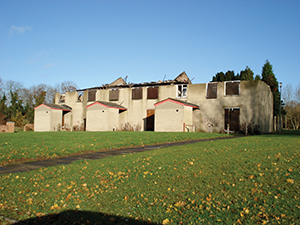Housing Executive audit
 A recent report by the Northern Ireland Audit Office was critical of a number of land dealings made by the Northern Ireland Housing Executive between 2004 and 2010.
A recent report by the Northern Ireland Audit Office was critical of a number of land dealings made by the Northern Ireland Housing Executive between 2004 and 2010.
The Northern Ireland Housing Executive (NIHE) is an executive non-departmental public body of the Department for Social Development established in 1971 with responsibility for social housing in Northern Ireland.
It is one of Northern Ireland’s largest landowners but some of this land is considered as underdeveloped land and is either used to support the building of new social homes, retained for potential future use or declared surplus to requirements and offered for sale on the open market.
Since 2005, there have been 1,374 land disposals including 161 to registered housing associations for new build schemes.
In 2009, significant issues were raised by whistle-blowers and MLAs about the NIHE’s procurement processes. In 2012 the Comptroller and Auditor General issued a report to the Assembly highlighting serious weaknesses in NIHE’s management of response maintenance contracts. The Northern Ireland Audit Office’s most recent report reviews the governance of Land and Property function within the Northern Ireland Housing Executive.
The report revealed recurring weaknesses across a number of disposals and transactions in the period between 2004 and 2010. These weaknesses, the report claims, led to a breakdown in NIHE’s internal controls. As a result NIHE could not always demonstrate value for money, particularly when disposing of land to private developers.
The report is also critical of the management of land and property services, describing it as an “inherently vulnerable” area. It also expresses concern that a number of well established safeguards, to ensure value for money, were not in place.
The report also stated that the weaknesses in NIHE’s governance and an inadequate internal control environment, prevented the public body from protecting its own interests.
The cumulative effects of these weaknesses allowed the Housing and Regeneration Division to operate with a minimum of oversight and challenge. However the report does note that since 2010 both the department and NIHE have taken action to strength their controls surrounding land and property  disposal. New systems of control and governance are in place and the NIHE Board exercises much better oversight of the organisation.
disposal. New systems of control and governance are in place and the NIHE Board exercises much better oversight of the organisation.
Reflecting on the report’s findings, the Comptroller and Auditor General, Kieran Donnelly said that the report would serve as a reminder for all public bodies that their systems of governance need to be effective.
“Governance regimes require a culture of compliance if they are to be effective and those entrusted with the leadership must give the lead on this,” he said.
The report also highlights five lessons for the wider public service, these are:
• boards should instil a governance compliance culture throughout their organisation and look to senior
officers to safeguard and nurture that culture and provide regular assurance on its application;
• staff should only take decisions to the extent that their authority to do so is delegated by the Board. Boards should ensure compliance with their scheme of delegation;
• governance systems consist of a range of checks and balances. Those charged with governance have a responsibility to ensure that these are working effectively and are not overridden or circumvented by others in authority. Staff have a responsibility to ensure that they fully comply with these checks;
• public bodies should ensure that the conclusions and recommendations of governance and internal audit reviews in specific business areas are read across to all other relevant business activities;
• department’s sponsorship arrangements should include a regular assessment of arm’s length bodies’ compliance with their governance framework.
Key findings
2010 events
It was a series of events in 2010 that first focused attention on the governance of the Northern Ireland Housing Executive. In January 2010, alleged irregularities were raised by internal complaints in respect of NIHE’s dealings with a site at Nelson Street in Belfast. The case was eventually referred to the PSNI, who submitted a file to the PPS in July 2011. In September 2010 the Northern Ireland Commissioner for Complaints issued a report on the disposal of NIHE land at Hardcastle Street in Belfast. He found in favour of the complainant and the legal action that followed resulted in an out of court settlement of £75,200 against the NIHE.
Breakdown in controls
Between 2007 and 2010 the report states that NIHE’s Director of Housing and Regeneration, Colm McCaughley declared in NIHE’s register of interests that a close family member was an employee of a property development company which invested in Northern Ireland. Despite this declaration, the Director continued to assist connected property development companies in land transactions connected with NIHE. However, the report does note that the private development company informed the Audit Office that they did not benefit to any extent from the relationship between Colm McCaughley and his close family member.
The NIAO also discovered that between 2004 and 2010, the NIHE investigation team found a number of cases in which NIHE sold land without open market competition. The report also states that poor planning and contract management by NIHE in land disposals had the cumulative effect of weakening the position of NIHE and ensured that in a small number of disposals, the balance of risk and reward lay with the private developer.

Tackling weaknesses
In a report to the department and NIHE in February 2004, the Local Government Auditor highlighted a series of concerns with the Houses for Land schemes. Concerns included a lack of documented procedures, no economic appraisals and lack of independent land valuations at contract award stage. However, the report’s recommendations were not read across to other land disposals to private developers.
In 2007, the department asked its internal audit unit to carry out a review of its monitoring arrangements for land disposal by NIHE. The audit found that weaknesses in the departments monitoring arrangements meant that they had insufficient information to effectively monitor the programme. Information that should have been supplied by NIHE to the department was not sent and no follow up action had been taken by the department.
Improvements
The report by the NIAO notes that the NIHE has subsequently strengthened its controls over land and property transactions and in 2011 introduced a new digital Land Terrier Management System. The system provides a digital record of all maps and deeds for all land acquired and disposed of by NIHE.
Departmental oversight and monitoring has also increased. The department’s Housing and Finance Division now receives regular reports from NIHE, detailing disposals of land and property from the Undeveloped Land Schedule. However, the report is critical of the range of manual and electronic systems and databases, which are not linked, that are still used by the NIHE to monitor land disposal.
The report states that these systems do not produce management information that is as complete, timely or accurate as it could be.
Recommendations
The report makes four recommendations to address these issues. On the issue of land disposal management, the report recommends that NIHE ceases maintaining a series of local databases and a central system should be put in place to record all land disposals. Similarly the report recommends that the NIHE develops a single end-to-end land sales system that will link the Land Terrier Management System to other aspects of NIHE’s land and property activities.
The report also recommends that the NIHE’s board should consider requesting at least an annual schedule of all land disposals. This, the report states, should include a LPS valuation and date of valuation, sale date, purchaser and proceeds received and ULS or non ULS declassification for each disposal. Finally the NIAO wants to see the NIHE produce a new Asset Management Strategy.
With the recommendations now in place, the report is in the hands of the department and the NIHE for their consideration.





